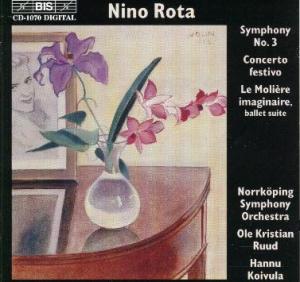Curio Corner
Nino ROTA
Symphony No. 3 in C major* Concerto festivo (Concerto for Orchestra in F major) Le Molière imaginaire – Ballet Suite.
Norrköping Symphony Orchestra conducted by Ole Kristian Ruud* and Hannu Koivula
BIS CD 1070 [60:00]

These are three late concert works unconnected with Rota’s work for films. Nonetheless they are immediately accessible and colourful and, although the Symphony and the Concerto festivo have no programmes, their content nevertheless sets the imagination flying.
The Symphony dates from 1956-57 and one detects a strong influence of Prokofiev (and, in its opening light-hearted movement, a similarity to John Ireland’s A London Overture in his evocation of urban bustle). The second movement begins with misty oscillations before military brass signals not so much a funeral march as an elegy. The last movement has the buffoonery and grotesque musical figures that Rota has used in Fellini’s films; it’s almost as if you are listening to music for a commedia dell’arte production.
Rota’s Concerto festivo was premiered in Rome in 1962. Here he pays tribute to Mussorgsky and Ravel (in Pictures from an Exhibition mode), two composers he particularly admired. Again, there is rapid picaresque-like material, full of sardonic humour as well as slower, darker more introspective material. As might be expected from a work with a subtitle of Concerto for Orchestra, Rota’s score makes demands on all sections of the orchestra; the woodwinds are stretched, for instance, through the quirky phrases and rhythms of the quicksilver Cabaletta movement; and mourning brass are spotlighted in the Elegia. The finale is as skittish as it is fast and furious.
The highlight of this compilation is undoubtedly the infectiously joyous and frothy and hauntingly romantic confection that is Le Molière imaginaire suite. Le Molière imaginaire was a ballet-comedy choreographed by Maurice Béjart who admired Rota’s work for Fellini. Rota prepared a suite from the ballet and this was first performed under Rota’s direction in Naples at the end of 1978. The music of the suite concentrates on the more joyous, comic elements of the original score to the exclusion of the sadder, more melancholy episodes of the ballet. If you remember all those Fellini film scores you can imagine the colour and vivacity of this music.
Undemanding, pleasing music from one of the masters of Italian film music played with style and verve
Ian Lace
[no ratings]
Return to Index